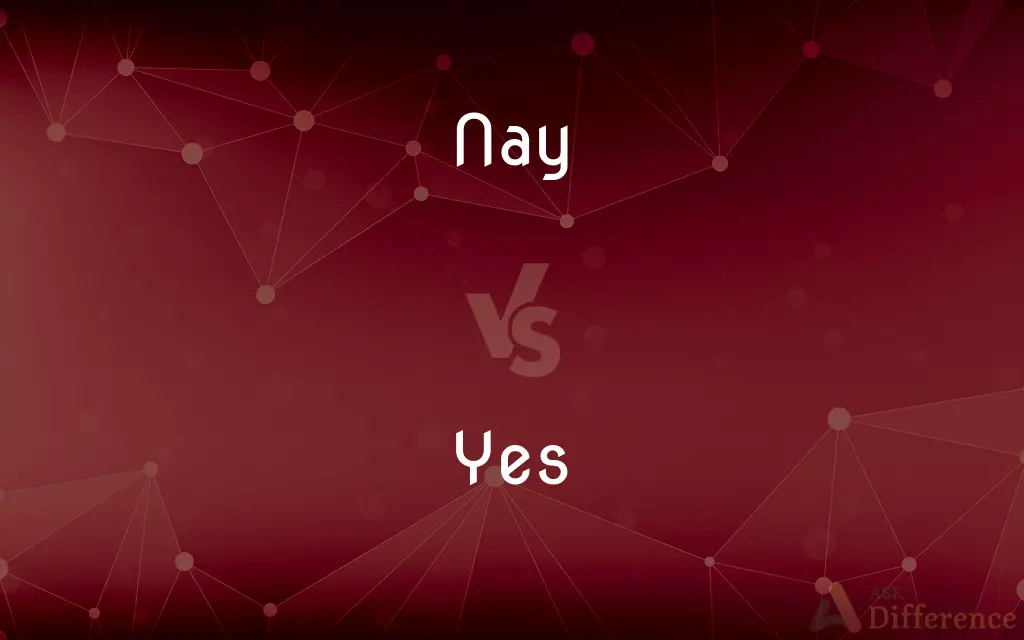Nay vs. Yes — What's the Difference?
By Maham Liaqat & Fiza Rafique — Updated on May 2, 2024
"Nay" is used to express refusal or denial, often in formal or voting contexts, whereas "yes" affirms or agrees in a wide range of conversational and formal situations.

Difference Between Nay and Yes
Table of Contents
ADVERTISEMENT
Key Differences
"Nay" is a term often associated with formal or old-fashioned contexts, particularly used in legislative or group voting scenarios to denote opposition or rejection. On the other hand, "yes" is a universally recognized affirmative response used in everyday conversations to express agreement or confirmation.
In voting situations, "nay" is the explicit expression used to cast a negative vote. It is typically heard in formal assemblies like parliaments or councils. Whereas "yes" is used to vote in favor of a motion or question, signifying approval and support.
The usage of "nay" can also carry a somewhat dramatic or emphatic tone, especially in literary or historical contexts. In contrast, "yes" is straightforward and devoid of any old-fashioned connotations, making it versatile for both casual and formal communications.
"Nay" is less common in casual conversation and might be perceived as archaic or overly formal. Conversely, "yes" is one of the most frequently used words in English, applicable in virtually any situation requiring affirmation.
While "nay" often requires specific conditions or settings (like formal votes) to be appropriate, "yes" can modify its meaning slightly with tone or additional words ("yes, indeed," "yes, of course") to fit a variety of emotional and social contexts.
ADVERTISEMENT
Comparison Chart
Usage Context
Formal, voting
Any context
Connotation
Formal, sometimes old-fashioned
Universal, neutral
Commonness
Less common, specific scenarios
Extremely common
Emotional Tone
Often neutral or formal
Varies widely (neutral, enthusiastic, confirming)
Modification in Usage
Rarely modified
Often modified for emphasis or politeness
Compare with Definitions
Nay
Used in formal voting to oppose a proposal.
The chair called for votes, and she voiced her nay.
Yes
Used to express consent.
Yes, you may go ahead with your plan, she authorized.
Nay
Can suggest contradiction or correction.
Nay, it was not so, he corrected her quietly.
Yes
Adaptable in various contexts for emphasis.
Yes, indeed, that's a great idea, she agreed enthusiastically.
Nay
Often found in historical or literary contexts.
Nay, my lord, that cannot be, she protested in the play.
Yes
Indicates positivity or enthusiasm.
Yes! We won the game! he cheered.
Nay
No
All but four Democrats voted nay.
Yes
Used to give an affirmative response
‘Do you understand?’ ‘Yes.’
Nay
And moreover
He was ill-favored, nay, hideous.
Yes
Used as a response to someone addressing one or trying to attract one's attention
‘Oh, Mr Lawrence.’ ‘Yes?’
Nay
A denial or refusal.
Yes
Used to question a remark
‘It should be easy to check.’ ‘Oh yes? How?’
Nay
A negative vote or voter.
Yes
Encouraging someone to continue speaking
‘When you bought those photographs …’ ‘Yes?’
Nay
No.
Yes
Expressing great pleasure or excitement
Plenty to eat, including hot hamburger sandwiches (yes!)
Nay
Introducing a statement, without direct negation.
Yes
Expressing irritation or impatience
‘Is the pain still there?’ ‘Yes, yes, damn you, the pain is always there’
Nay
Or rather, or should I say; moreover (introducing a stronger and more appropriate expression than the preceding one).
His face was dirty, nay, filthy.
Yes
An affirmative answer or decision, especially in voting
Answering with assured and ardent yeses
Nay
(archaic) No.
Yes
It is so; as you say or ask. Used to express affirmation, agreement, positive confirmation, or consent.
Nay
A vote against.
I vote nay, even though the motion is popular, because I would rather be right than popular.
Yes
An affirmative or consenting reply.
Nay
A person who voted against.
The vote is 4 in favor and 20 opposed; the nays have it.
Yes
An affirmative vote or voter.
Nay
(archaic) A denial; a refusal.
Yes
To give an affirmative reply to.
Nay
(obsolete) To refuse.
Yes
Used to express great satisfaction, approval, or happiness.
Nay
(obsolete) Nary. en
Yes
(interrogative) Used to ask for more information with a request.
I need some help.
Yes?
Yes?
Nay
No; - a negative answer to a question asked, or a request made, now superseded by no. Opposed to aye or yea. See also Yes.
And eke when I say "ye," ne say not "nay."
I tell you nay; but except ye repent, ye shall all likewise perish.
And now do they thrust us out privily? nay, verily; but let them come themselves and fetch us out.
He that will not when he may,When he would he shall have nay.
Yes
An affirmative expression; an answer that shows agreement or acceptance.
Was that a yes?
Nay
Not this merely, but also; not only so, but; - used to mark the addition or substitution of a more explicit or more emphatic phrase.
Yes
A vote of support or in favor/favour of something.
The workers voted on whether to strike, and there were thirty "yeses" and one "no".
Nay
Denial; refusal.
Yes
To agree with, affirm, approve.
Did he yes the veto?
Nay
A negative vote; one who votes in the negative.
Yes
(slang) to attempt to flatter someone by habitually agreeing
Nay
To refuse.
Yes
Ay; yea; - a word which expresses affirmation or consent; - opposed to no.
Nay
A negative;
The nays have it
Yes
An affirmative;
I was hoping for a yes
Nay
Not this merely but also; not only so but;
Each of us is peculiar, nay, in a sense unique
Yes
Affirmative response or agreement.
When asked if he was ready, he replied, Yes.
Nay
A word used to express negation or refusal.
When asked if he agreed with the policy, he responded with a firm nay.
Yes
Used to confirm statements.
Yes, that is exactly what happened, he confirmed.
Nay
Indicates rejection.
Nay, he said, turning down the offer.
Common Curiosities
What are some synonyms for "nay"?
Some synonyms for "nay" include "no," "not," and "never."
Is "nay" a common term in everyday language?
No, "nay" is considered formal and somewhat archaic, typically reserved for specific contexts like legislative environments.
What does "nay" mean?
"Nay" is a word used to express negation, refusal, or denial, often in formal settings like voting.
How can the tone affect the meaning of "yes"?
The tone can significantly alter the meaning of "yes," from enthusiastic agreement to a reluctant affirmation.
Is "nay" ever used in questions?
"Nay" is not typically used in questions; it's more commonly used in responses or declarations.
Are there formal alternatives to "yes"?
Formal alternatives to "yes" include "affirmative," "certainly," and "indeed."
What is the origin of "nay"?
"Nay" originates from the Old Norse word "nei," meaning no.
Can "yes" be used sarcastically?
Yes, "yes" can be used sarcastically depending on the speaker's tone and context.
Can "yes" be used in formal communications?
Yes, "yes" is versatile and can be used across both casual and formal communications effectively.
How does the use of "nay" in legislative settings affect its perception?
Its use in legislative settings reinforces its perception as a formal and somewhat outdated term.
Share Your Discovery

Previous Comparison
Financier vs. Investor
Next Comparison
Pliers vs. TweezersAuthor Spotlight
Written by
Maham LiaqatCo-written by
Fiza RafiqueFiza Rafique is a skilled content writer at AskDifference.com, where she meticulously refines and enhances written pieces. Drawing from her vast editorial expertise, Fiza ensures clarity, accuracy, and precision in every article. Passionate about language, she continually seeks to elevate the quality of content for readers worldwide.













































